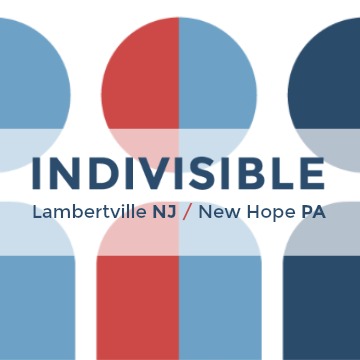Contributed by Deb Kline.
Review and Action from ILNH’s First Springboard Meeting
The first-ever ILNH Springboard Meeting hosted Johanna Calle, director of the NJ Alliance for Immigrant Justice  (NJAIJ), who spoke to a crowd of 20 Indivizzies and friends about the issues facing immigrants on the federal and state level. The Alliance is a statewide coalition of more than 40 faith, labor and community organizations that promote policies in NJ to advocate for and support documented immigrants and those seeking status.
(NJAIJ), who spoke to a crowd of 20 Indivizzies and friends about the issues facing immigrants on the federal and state level. The Alliance is a statewide coalition of more than 40 faith, labor and community organizations that promote policies in NJ to advocate for and support documented immigrants and those seeking status.
Johanna spoke about the changes in immigration policies over the past 20 years, noting that the window of opportunity for an immigrant to gain residence in the U.S. has increasingly narrowed. Today, an immigrant seeking permanent residence requires that they must be directly related to a U.S. citizen, i.e., spouse or child. She also explained that many ‘unlawful’ immigrants are those that have overstayed a travel visa or had an expired Green Card, in which case they are banned from the U.S. for ten years.
“The reality is, the immigration laws are broken,” said Johanna. Her own family came to the U.S. in 1995, and was able to get Social Security numbers, driver’s licenses, open a business. But that all changed after September 11, 2001, when laws began to tighten following the terrorist attacks.
The need for wholesale immigration reform is widely recognized across the political spectrum, but broad disagreement on how to go about it has necessitated that advocacy groups focus on smaller pieces of the issue to make headway. In the meantime, organizations like NJAIJ are putting efforts into helping those at risk avoid deportation, and advocating for policies that limit the level of reach of Immigration and Customs Enforcement (ICE) and Customs and Border Patrol (CBP).
Currently, NJAIJ has two focus areas: In addition to family unity and protection from deportation, the organization is advocating for the expansion of driver’s licenses to immigrants seeking status. With the campaign, “Let’s Drive NJ,” the organization works to bring NJ in alignment with the other twelve states which allow undocumented immigrants obtain licenses. Doing so will help increase public safety, help the state’s economy and increase the well-being of families. A note here that although the NJAIJ is a NJ-based organization, Pennsylvania has a similar program working to expand access to driver’s licenses.
The Springboard meeting on March highlighted the many actions Indivisible members can advocate for on the state and local levels of government. This is very good news. Possible activities of our group include monthly postcard parties, urgent PRN post card parties, organize trips to the Elizabeth Detention Center, monthly calls to state/local officials, etc. In addition, we will be maintaining ongoing contact with Johanna, to stay updated and send out alerts to Indivisible when there is an action that needs to be taken.
On the schedule: A follow up meeting of the NJ Immigration Advocacy team to organize actions will be on April 4 at 7:30 p.m. at the Lambertville Free Public Library.
Eye Openers:
- ICE has funding to detain 40,000 people; however, it currently holds 50,000. There is a huge funding gap that needs to be made up.
- NJ has the third largest number of immigrants in the country and the fifth largest number of undocumented immigrants.
- Detention pays: In NJ, counties and corporations are paid $170 per day for each person who is housed in a detention center.
- NJ counties Essex, Hudson and Bergen, are currently receiving funds for detention housing that go directly into the county budget.
- Witnesses and victims of crimes who fear their personal detention or deportation avoid reporting incidents to law enforcement as ICE patrols the courts and works with local police and organizations.
- Language is important: Use “fair and welcoming” instead of “sanctuary.” The latter implies that immigrants are safe and that the municipality may be breaking the law.
- “Affiliation” with a gang is a factor leading to deportation; however, young people have been picked up simply for wearing a personal item of clothing that happens to be one of the colors of a gang.
- Undocumented immigrants pay taxes and Social Security, but are blocked from receiving any of the benefits.
- At the federal level, NO new laws have been passed with regard to immigration policy and access to citizenship. All changes have been made at the administrative, Department of Homeland Security level.
Noteworthy:
- In NJ, new rules went into effect on March 15, implemented by the NJ Attorney General, called the “Immigrant Trust Directive.” This trust outlines when the state’s 36,000 police officers can ask people about their immigration status and cuts back on cases where police can cooperate with federal Immigration agents. The rules also limit when county jails can detain prisoners who are in the country illegally.
- In the U.S. Congress, HR 6 was introduced in the House the week of March 11, and deals with Dreamers and those with Temporary Protected Status. Representatives Tom Malinowski and Bonnie Watson-Coleman are co-sponsors.
In Pennsylvania – organizations that provide support and advocacy for immigrants include:
Immigrant Rights Action/Grupo de Acción of Doylestown is a way to get involved with local actions. The group has developed packets to enable constituents to talk to their legislators, and works in conjunction with other groups to provide local trainings for allies and immigrants. The organization recently incorporated and has established office space to meet with community members. Group meetings on the first Wednesday of the month. Reach out to Sue Ann DeVito if you would like to join.
MILPA spearheads the legislation for Pennsylvania drivers licenses. When the legislation is introduced, we will need to call state legislators for support. Chris Rabb, State Representative (200th HD) , is working on introducing a bill.
Shut Down Berks is a coalition working on shutting down the Berks Detention Center. They organize vigils, rallies, postcard parties and legislative advocacy. Follow their page on Facebook to see upcoming calls to action.
PICC (Pennsylvania Immigration and Citizenship Coalition) has many resources to help the community on their website. The activist tab has a plethora of information, and areas you can take action. Recommended: sign up for their STOP THE HATE CALLS.
Welcoming The Stranger is in Bucks County and has free classes and resources for immigrants and refugees.




I would like to do a postcard party if you are still needing a space I can be reached by e mail or phone